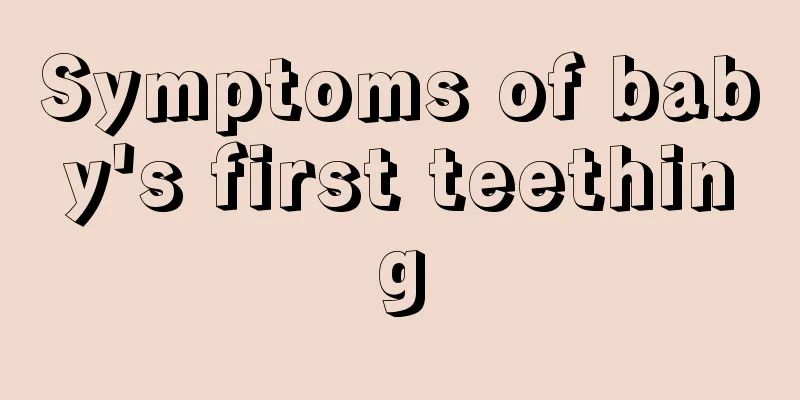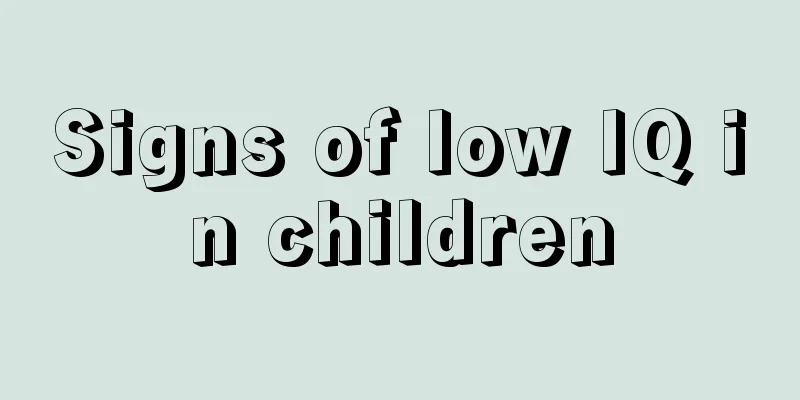Symptoms of baby's first teething

|
When the baby's first tooth grows, parents will be extremely excited. The baby will also show some symptoms during the teething period. The first is pain. Babies with teething will be very irritable and prone to crying, especially in the past two days. Their cheeks will be red, and they will drool frequently. They like to chew hard things and rub them on their gums. These are the symptoms of teething. Symptoms of teething in babies Babies will have some abnormal behaviors during teething, and different babies will have different behaviors. Generally speaking, there are nine aspects: 1. Pain: Your baby may show signs of pain and discomfort. 2. Bad temper: The discomfort caused by teething can make the baby bad tempered and cry a lot, which is especially obvious one or two days before teething. 3. Red cheeks: You may notice red spots on your baby’s cheeks. 4. Drooling: The excessive saliva produced during teething will cause the baby to drool frequently. 5. Chewing, biting or chewing things: If you put anything near the baby's mouth, he may do the above actions. 6. Swollen gums: Check his mouth to see if there is any redness or swelling on the gums. 7. Restless sleep: Your baby may wake up in the middle of the night and seem irritable, even though he had been sleeping soundly before. 8. Increased body temperature: Teething can cause the body temperature to rise slightly, so your baby may feel a little hotter than usual. 9. Butt pain: Although we don't know the reason yet, some parents have noticed that babies are more likely to suffer from diaper rash and may have loose stools when they are teething. Reasons why babies' teeth grow too slowly 1. Congenital heredity: The main reason why young children grow teeth slowly is genetics, including family medical history, race, and even gender differences. According to most research reports, girls' teeth grow earlier than boys. 2. Acquired environment: In addition to congenital genetic factors, the acquired environment may also indirectly cause slow tooth growth. Take premature babies for example. The time of their teeth growth must be deducted from the time of their premature birth, so that the conclusion drawn can be more accurate. If the baby is born prematurely at 30 weeks of gestational age, the growth of the first tooth must be delayed by 10 weeks (usually 6 to 8 months after birth). In addition, babies who are born with low birth weight are also likely to have slow teething. 1. Systemic diseases: Down syndrome, abnormal pituitary secretion, ectodermal dysplasia syndrome, etc. may all cause differences in the speed of tooth growth in young children. Blood tests must be performed to determine the true cause. |
<<: Symptoms of baby's formaldehyde allergy
>>: What to do if you have urine leakage after giving birth
Recommend
What causes children's front teeth to turn outward?
The pursuit of beauty is believed to be the goal ...
Is respiratory distress syndrome hereditary?
Respiratory distress disorder is a disease that i...
What are the nutritious breakfasts for young children?
Breakfast should be started from childhood, and i...
How much sleep does a three-year-old baby need?
When the baby is sleeping, you must pay attention...
What medicine should children take for urticaria
As parents, we should all be aware that children&...
What should children eat if they have a hoarse throat?
Many parents often find that their children have ...
What are the causes of encephalitis in children? How to treat it?
Children have lower body resistance, so they are ...
What fruits are suitable for babies to eat when they have a cold?
The most obvious sign of a baby catching a cold i...
What causes hearing loss in children? Causes of hearing loss in children
Children's hearing loss may be related to oti...
Clinical manifestations of heart failure in children
The situation of heart failure in children is sti...
How to deal with a child's cough and nosebleed?
Children are our hope for the future, because the...
What to do if your child doesn't like taking naps?
When taking care of their baby, every parent hope...
How to solve the problem of spinal curvature in children?
The physical development of children is a big dea...
How to treat moderate anemia in babies
When a child has anemia, his body is very weak. A...
What will happen if a child drinks expired milk?
Some manufacturers nowadays really have no morals...









